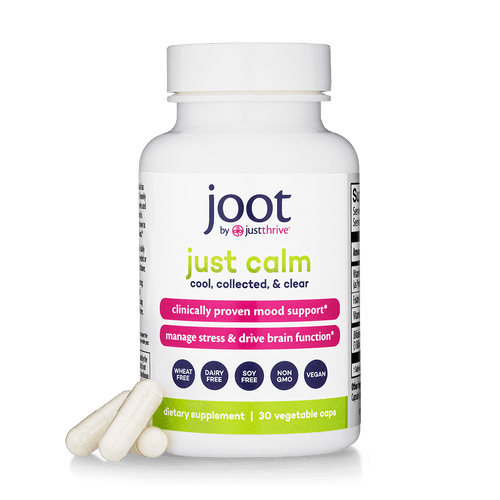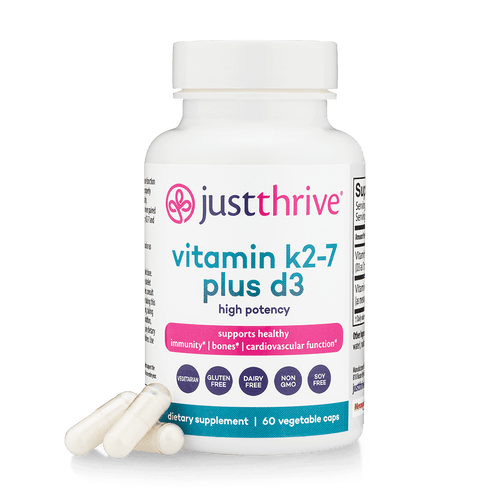7 ways to calm that nerve and your mind
Anxiety can derail your life. It’s more than worry, more than stress. It’s a daily struggle to keep your thoughts from spiraling and making you feel out of control.
Anxiety can interfere with every aspect of your day. It’s harder to get to work or school, socialize, or even rest and relax at home.
But you can help your mind and body settle down, taming that apprehension by working directly with your nervous system. Specifically your vagus nerve, the one that calls the shots when it comes to anxiety.
The Vagus Nerve: Your Gut-Brain Connection
Your vagus (pronounced like Vegas) nerve is a key part of your parasympathetic nervous system, the system responsible for rest, relaxation, and digestion. It’s the system that calms your body after a period of danger or stress.
The vagus nerve delivers signals from your brain to your body… and from your body to your brain. Its most important section is in your gut, creating the gut-brain axis. This two-way communication superhighway affects every aspect of brain function:[1,2,3,4]
- learning and memory
- focus and attention
- decision making
- stress responses
- emotional state
- mood regulation
- depression
- anxiety
Vagus nerve stimulation keeps your brain clear and calm, stopping anxiety and letting you fully relax.[5]

Vagal Tone Lets You Relax, Sleep, and Self-Soothe
The activity level of your vagus nerve is called vagal tone. Vagal tone measures vagus nerve function: higher vagal tone delivers stronger stress resilience and more balanced mood regulation.
High vagal tone slows your heart rate and boosts your heart rate variability (HRV). Low HRV—less variability between heartbeat—is linked to anxiety and panic attacks.[6]
Low vagal tone is also associated with insomnia and other sleep disorders.[7]
When your vagus nerve is more active you’re better able to relax, sleep, and calm yourself down. Stimulating your vagus nerve can take you from hyped up and frantic to chill and peaceful within minutes.

7 Ways to Naturally Stimulate Your Vagus Nerve and Promote Calm
Nature makes it easy to increase your vagal tone and decrease your anxiety. Here are the 7 best ways to activate your vagus nerve and turn off your anxiety hyperdrive.
1. Focus on Your Breathing
There’s a reason you calm down when you pay attention to your breath: It stimulates your vagus nerve. The best techniques for this include alternate nostril breathing and belly breathing.
Alternate nostril breathing involves closing off one nostril and breathing only through the other for a complete breath. Then switch nostrils for the second breath. Alternate between your nostrils for a total of 10 complete breaths. This helps balance and evenly stimulate the vagus nerve.[8]
Belly breathing calls for expanding your belly like a balloon when you inhale and deflating that balloon when you exhale. For the best effect inhale through your nose into your belly for a count of 4, hold that breath for a count of 4, and then exhale slowly for a count of 4. Do 10 complete belly breaths to stimulate your vagus nerve.[9]
2. Cool Things Down
When your face or neck gets exposed to cold, it triggers a reflex that activates the vagus nerve. This sends your body a signal to slow down and relax. Get this effect by putting a cold compress or covered icepack on your cheeks, forehead, and the back of your neck to stimulate your vagus nerve.[10]
3. Stretch Your Neck
A tight, stiff neck can inhibit vagus nerve function. Stretching your neck helps release tense muscles that put pressure on the vagus nerve. Gentle neck stretches can relax the area and positively stimulate your vagus nerve. Slow, gentle head rolls can do the trick here. Bring your chin to your chest, then slowly roll your head clockwise in a complete circle 5 times. Then go back to the starting position with your chin to your chest and repeat the exercise in a counterclockwise direction.
4. Practice Meditation
Mindful meditation promotes awareness and focus that can activate your vagus nerve.[11] It works by bringing your attention to the present, relaxing your entire nervous system, and slowing your heart rate. This activity stimulates the vagus nerve, soothing anxiety and quieting anxious thoughts.
5. Connect with Nature
Spending time outdoors increases vagus nerve activity.[12] Research shows that spending as little as 10 minutes outside improves mental health and doing that regularly helps build emotional resilience.[13] Whether you sit on a park bench, walk in a field, or practice forest bathing, interacting with nature will stimulate your vagus nerve and calm your anxiety brain.
6. Balance Your Gut Microbiome
Your gut bacteria have a great impact on your mental health, thanks to the vagus nerve. That direct connection lets beneficial probiotic gut bacteria help calm occasional anxiety and promote clear thinking in a few ways. For one thing, probiotic bacteria produce calming brain chemicals like serotonin and GABA.[14] They also help keep stress hormones like cortisol in check, aiding your body settling down after a stressful experience.[15]
But when your gut microbiome falls out of balance, a condition called dysbiosis, pathogenic bacteria outnumber probiotics. Dysbiosis cancels out all the good probiotic bacteria can do. Pathogenic bacteria can hijack your vagus nerve, sending the wrong messages to your brain, which sets you up to experience more negative emotions and anxiety.[16,17,18] That’s why a balanced gut microbiome matters for your mental health. And the best way to keep it in balance is with high-quality spore probiotics.
7. Manage Stress Effectively
Stress activates your sympathetic nervous system, the part responsible for fight-or-flight. That response inhibits vagus nerve activity, keeping your mind and body in emergency mode. The more often you’re stressed the harder it gets for your body to manage it. That’s where a unique probiotic called Bifidobacterium longum 1714™ can make all the difference.
Research shows that B. longum 1714™ helps your body manage stress more effectively. B. longum 1714™ essentially turns your stress “switch” to the off setting, giving your mind and body the chance to settle down and relax. It does that by promoting healthy cortisol levels and encouraging your brain’s natural stress-coping mechanisms.
Clinical studies show that B. longum 1714™:
- Can help maintain healthy cortisol levels and reduce everyday stress perception[19]
- Reduces beta wave activity, which is connected with nervousness and hypervigilance. It simultaneously increases theta wave activity, which is associated with calmness, relaxation, and creativity.[20]
- Promotes healthy sleep quality and sleep duration even in the face of stressors[21]
B. longum 1714™ sets the stage for vagus nerve stimulation by helping your body manage stress the right way. And that goes a long way toward calming everything down.
Support Your Vagus Nerve with Just Thrive
Your vagus nerve has a big job. It helps your body relax, digest, sleep, and remain calm.
But we live in a very stressful world. And that can hamper vagus nerve activity. So you’ll want to give your body’s calming station as much support as you can. Just Thrive Probiotic and Just Calm can help with that.
Just Thrive Probiotic delivers a powerful blend of 4 clinically-proven spore probiotics that work quickly to keep your gut microbiome in healthy balance. Just Thrive Probiotic contains:
- Bacillus subtilis HU58™
- Bacillus indicus HU36™
- Bacillus coagulans
- Bacillus clausii
Just Calm contains Bifidobacterium longum 1714™, the unique psychobiotic shown to help your body handle stress effectively. And to ramp up the calming powers, Just Calm also delivers a stress-soothing blend of vitamins B6, B9, and B12.
And if you’re not quite sure about trying Just Thrive, we can help with that.
EVERY Just Thrive purchase is covered by our Bottom of the Bottle, 100% money back guarantee.
That means you can try Just Thrive Probiotic and Just Calm to see how well they work for you… and we’re confident that you’ll notice a positive difference.
But if for any reason you don’t feel any benefits, you can ask for a full product refund at any time. Even if it’s 3 months or 3 years later. Even if the bottle is empty!
Sources
- Appleton J. The Gut-Brain Axis: Influence of Microbiota on Mood and Mental Health. Integr Med (Encinitas). 2018 Aug;17(4):28-32. PMID: 31043907; PMCID: PMC6469458.
- Rusch JA, Layden BT, Dugas LR. Signalling cognition: the gut microbiota and hypothalamic-pituitary-adrenal axis. Front Endocrinol (Lausanne). 2023 Jun 19;14:1130689. doi: 10.3389/fendo.2023.1130689. PMID: 37404311; PMCID: PMC10316519.
- Misiak B, Łoniewski I, Marlicz W, Frydecka D, Szulc A, Rudzki L, Samochowiec J. The HPA axis dysregulation in severe mental illness: Can we shift the blame to gut microbiota? Prog Neuropsychopharmacol Biol Psychiatry. 2020 Aug 30;102:109951. doi: 10.1016/j.pnpbp.2020.109951. Epub 2020 Apr 23. PMID: 32335265.
- Aniwattanapong D, List JJ, Ramakrishnan N, Bhatti GS, Jorge R. Effect of Vagus Nerve Stimulation on Attention and Working Memory in Neuropsychiatric Disorders: A Systematic Review. Neuromodulation. 2022 Apr;25(3):343-355.
- Breit S, Kupferberg A, Rogler G, Hasler G. Vagus Nerve as Modulator of the Brain-Gut Axis in Psychiatric and Inflammatory Disorders. Front Psychiatry. 2018 Mar 13;9:44.
- Pittig A, Arch JJ, Lam CW, Craske MG. Heart rate and heart rate variability in panic, social anxiety, obsessive-compulsive, and generalized anxiety disorders at baseline and in response to relaxation and hyperventilation. Int J Psychophysiol. 2013 Jan;87(1):19-27.
- Kim H, Jung HR, Kim JB, Kim DJ. Autonomic Dysfunction in Sleep Disorders: From Neurobiological Basis to Potential Therapeutic Approaches. J Clin Neurol. 2022 Mar;18(2):140-151.
- Pal GK, Agarwal A, Karthik S, Pal P, Nanda N. Slow yogic breathing through right and left nostril influences sympathovagal balance, heart rate variability, and cardiovascular risks in young adults. N Am J Med Sci. 2014 Mar;6(3):145-51.
- Gerritsen RJS, Band GPH. Breath of Life: The Respiratory Vagal Stimulation Model of Contemplative Activity. Front Hum Neurosci. 2018 Oct 9;12:397.
- Jungmann M, Vencatachellum S, Van Ryckeghem D, Vögele C. Effects of Cold Stimulation on Cardiac-Vagal Activation in Healthy Participants: Randomized Controlled Trial. JMIR Form Res. 2018 Oct 9;2(2):e10257.
- Sezer I, et al. Advanced and long-term meditation and the autonomic nervous system: A review and synthesis. Neuroscience & Biobehavioral Reviews. Volume 173, June 2025, 106141
- LoTemplio S, Bettmann JE, Scott E, Blumenthal E. Do Mental Health Changes in Nature Co-occur with Changes in Heartrate Variability and Executive Functioning? A Systematic Review. Curr Environ Health Rep. 2023 Sep;10(3):278-290.
- Bettmann JE, Speelman E, Jolley A, Casucci T. A Systematic Review and Meta-Analysis on the Effect of Nature Exposure Dose on Adults with Mental Illness. Behav Sci (Basel). 2025 Jan 31;15(2):153. doi: 10.3390/bs15020153. PMID: 40001784; PMCID: PMC11851813.
- Mhanna A, et al. The correlation between gut microbiota and both neurotransmitters and mental disorders: A narrative review. Medicine (Baltimore). 2024 Feb 2;103(5):e37114.
- Foster JA, Rinaman L, Cryan JF. Stress & the gut-brain axis: Regulation by the microbiome. Neurobiol Stress. 2017 Mar 19;7:124-136.
- Clapp M, Aurora N, Herrera L, Bhatia M, Wilen E, Wakefield S. Gut microbiota's effect on mental health: The gut-brain axis. Clin Pract. 2017 Sep 15;7(4):987. doi: 10.4081/cp.2017.987. PMID: 29071061; PMCID: PMC5641835.
- Rosas-Sánchez GU, Germán-Ponciano LJ, Puga-Olguín A, Soto MEF, Medina AYN, Muñoz-Carillo JL, Rodríguez-Landa JF, Soria-Fregozo C. Gut–Brain Axis in Mood Disorders: A Narrative Review of Neurobiological Insights and Probiotic Interventions. Biomedicines. 2025; 13(8):1831.
- Mörkl S, et al. Gut-brain-crosstalk- the vagus nerve and the microbiota-gut-brain axis in depression. A narrative review. Journal of Affective Disorders Reports. Volume 13, July 2023, 100607
- Allen AP, Hutch W, Borre YE, et al. Bifidobacterium longum 1714 as a translational psychobiotic: modulation of stress, electrophysiology and neurocognition in healthy volunteers. Transl Psychiatry. 2016;6(11):e939. Published 2016 Nov 1. doi:10.1038/tp.2016.191
- Wang H, Braun C, Murphy EF, Enck P. Bifidobacterium longum 1714™ Strain Modulates Brain Activity of Healthy Volunteers During Social Stress. Am J Gastroenterol. 2019 Jul;114(7):1152-1162.
- Moloney GM, et al. Improvements in sleep indices during exam stress due to consumption of a Bifidobacterium longum. Brain Behav Immun Health. 2020 Nov 13;10:100174.














